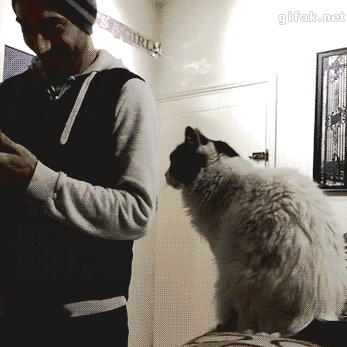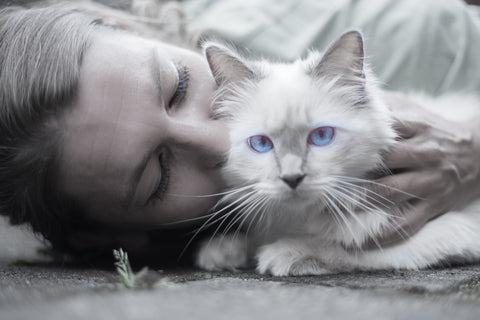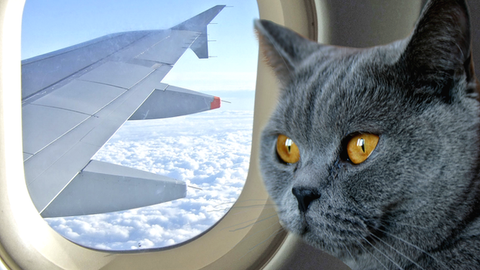Cats as Emotional Support Animals
For when you need 10ccs of cat cuddles, STAT.
An emotional support animal (ESA) is a pet that helps to mitigate the negative symptoms of a person’s emotional or psychological disability by calming and reducing emotional distress. ESAs are not considered service animals, and as such do not necessarily require training. An ESA can be any domesticated animal: cat, dog, rabbit, snake, pig, etc, and must be prescribed by a licensed mental health professional (therapist, psychiatrist) and have a letter showing they are part of the individual’s treatment plan.

Cats are ideal candidates for those in need of an emotional support animal. They are calm, intelligent and affectionate animals that can provide their owners with a soothing, comforting presence.

For people who struggle with anxiety, depression and other conditions that severely affect mood and mental well-being, some days it might be difficult to even get out of bed. The world is busy and noisy, full of pressures; Sometimes it seems impossible to lift your head, open your eyes and face the day, especially if you have to face it alone.

But imagine hearing the gentle, soothing rasp of a purr in your ear. Imagine feeling a warm, furry body tucked against you. As the looming thoughts of the day surround you, picture running your fingers through velvet fur. Suddenly, you don’t feel so alone.
In all the noise and tumult of the world, you know that there is someone who needs you, someone who relies on you; and as you feel those little paws gently tapping your cheek, maybe even the lightest tickle of a whisker or a damp little nose, followed by a mew that says, “It’s time to get up. I’m hungry," ... Getting up doesn’t seem so impossible now.


This is just one scenario in which cats can offer important emotional support to their guardians, showing how vital a cat (or pet) can be to a person's well-being. Studies have shown that petting a cat can produce a hormonal relaxation response in people that helps to reduce stress and cortisol levels, as well as lowering your heart rate and blood pressure.

Cats tend to have a naturally docile nature and can be the perfect pets for people in need of an emotional support animal, as they exude an aura of complete and utter calm, while at the same time having bright, unique personalities that can provide hours of entertainment and laughter.

What sets an ESA apart from a regular pet cat are the rights emotional support animals are given. While registration of an ESA is voluntary and not compulsory, ESAs with proper documentation are the only animals that will be provided with these rights. The Air Carrier Access Act of 1986 and the Fair Housing Amendments Act of 1988 are the laws that protect an emotionally disabled person and his/her ESA.

Under these laws, ESAs are able to accompany emotionally or mentally impaired persons on airplanes without incurring a fee, and cannot be turned away from no-pet housing situations. Emotional support animals on flights are expected to have some public training, however, so that the pet is safe and comfortable, as well as other passengers.

While they do provide emotional and mental support for their owners, an ESA is not considered a service animal, and businesses and public places are not legally required to allow access to your ESA.

Some public places and businesses have become somewhat hostile towards service animals and ESAs alike as people are falsely claiming their untrained and ill-behaved dogs as service animals.
In taking advantage of the laws in place to protect the rights of people in need of service animals and ESAs alike, many people are now viewing those with actual service animals and ESAs as fraudulent and irresponsible owners who just want to take their dog with them to a restaurant or their cat on the plane for free.
According to the dailymail.com, “A team of reporters at KUTV in Salt Lake City were able to register a stuffed dog … as an emotional support animal so it could be brought on board a plane.”

These fake service animals and the issues they cause can make going into public even more challenging and difficult for the people who actually struggle with disabilities. If you are thinking having your cat approved as an ESA, please only do so if you have spoken to a mental health professional and they recommend you need an ESA.

















Great article! Enjoy reading up your article, Yes, of course, a cat could be your emotional support animal . Thanks for sharing the article with us.
Its very interesting article .Thanks for sharing this informative article ..keep posting in future.https://www.pdscenter.com
Thank you for sharing.
Its very informative thanks for sharing ..
Years ago, my cat Morris kept me from suicide. After weeks of crying for no reason I was at the point of sitting in a closet with a loaded gun. My cat came into the closet and began rubbing against me, purring, and raising up to give me kisses. I immediately thought of what would happen to him if I was no longer there to care for him. The next day found me at the doctors where I was prescribed a medicine that in a period of a week or two had me feeling better. It’s scary, but true. That cat saved my life.
Leave a comment